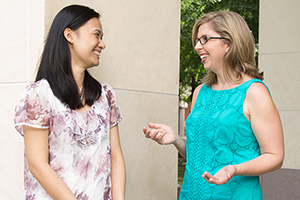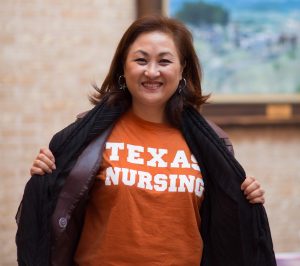Research Study by Kavita Radhakrishnan, PhD, RN (PI)
The Problem: Heart Disease

- Heart disease is the leading cause of death in the United States accounting for 25.4% of total deaths.
- Roughly 5.1 million people in the US have heart failure (HF).
- HF costs the nation an estimated $32 billion each year, according to data from the Healthy Communities Institute.
- Travis County averages over 850 deaths/year due to heart disease related complications.
Interactive Digital E-Health Game for Heart Failure Self-management
 Dr. Kavita Radhakrishnan is finishing up a transdisciplinary pilot study using a casino style slot game to teach self-management skills to patients with HF. Dr. Radhakrishnan contends that because poor outcomes in patients with HF are often due to lack of knowledge or motivation to change behavior, her study was designed to address this problem by providing a scalable platform to motivate, inform, and educate patients on what they could be doing to improve their health. Because HF is most common among aging adults, this game was one of the first designed for people aged 55+. The interface is simple. The player starts with a number of chips and then “spins” the reel. When you hit a winning combination, chips will be added to the credit meter. However, every three spins or so the player is given a mixture of HF related content in the form of questions, facts, and reminders about taking medications and dietary guidelines. If the player answers correctly they are rewarded with additional chips to play. The game has a built-in mechanism that reports how many spins each player has completed; enabling the research team to draw factual correlations between how much time the patient has played the game with their improvement in scores.
Dr. Kavita Radhakrishnan is finishing up a transdisciplinary pilot study using a casino style slot game to teach self-management skills to patients with HF. Dr. Radhakrishnan contends that because poor outcomes in patients with HF are often due to lack of knowledge or motivation to change behavior, her study was designed to address this problem by providing a scalable platform to motivate, inform, and educate patients on what they could be doing to improve their health. Because HF is most common among aging adults, this game was one of the first designed for people aged 55+. The interface is simple. The player starts with a number of chips and then “spins” the reel. When you hit a winning combination, chips will be added to the credit meter. However, every three spins or so the player is given a mixture of HF related content in the form of questions, facts, and reminders about taking medications and dietary guidelines. If the player answers correctly they are rewarded with additional chips to play. The game has a built-in mechanism that reports how many spins each player has completed; enabling the research team to draw factual correlations between how much time the patient has played the game with their improvement in scores.
Transdisciplinary Team
Dr. Radhakrishnan admits that a study like this could not have functioned without a transdisciplinary team. Paul Toprac, Ph.D. and Matthew O’Hair, M.ED. of the University of Texas at Austin Computer Science Department and the Game and Mobile Media Applications (GAMMA) Program worked on improving the feasibility of how to incorporate typical disease knowledge into a game format while Michael Mackert, Ph.D. from the Moody College of Communication contributed with programing, content management, usability testing, and health literacy. Working together, they were able to merge clinical and technical knowledge to create a more effective interface.
Community Impact
 What’s the best way to recruit patients into a study? Engage local treatment providers! Members of the health care community such as St. David’s Heart Failure Clinic, Texas Heart and Vascular, and Austin Heart Hospital have shown tremendous interest in the implications this study has for treatment and prevention of life threatening symptoms of heart failure. Eliciting their “buy-in” was a crucial step in gaining their active support for enrolling their patients into this pilot study.
What’s the best way to recruit patients into a study? Engage local treatment providers! Members of the health care community such as St. David’s Heart Failure Clinic, Texas Heart and Vascular, and Austin Heart Hospital have shown tremendous interest in the implications this study has for treatment and prevention of life threatening symptoms of heart failure. Eliciting their “buy-in” was a crucial step in gaining their active support for enrolling their patients into this pilot study.
Tips from the Principal Investigator
When asked for advice on working with a transdisciplinary team, Dr. Radhakrishnan recommends the following:
- Start with an open dialogue about the constraints that each group has, so that expectations are realistic when considering time frame, logistics, and budget.
- Objectively ask yourself “can this platform solve this problem?”
- When working with technology, try to build upon what already exists, rather than starting from scratch. This will save a lot of time and money, both of which are precious resources for up and coming researchers.


